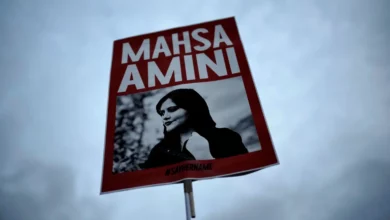In the past two days, social media has witnessed an outrage over statements made by MP Azza El-Garf of the Freedom and Justice Party. Garf, who is one of the very few female parliamentarians in the Islamist-dominated People’s Assembly, has called for the cancellation of the anti-harassment law. She justified her claims by stating that the indecent attire of women is what invites sexual harassment, hence harassers are not to be blamed. Garf’s statement has been mocked as mad, but the reality is that apart from being extremely disturbing, Garf is simply echoing the state’s de facto position on sexual assault, despite the presence of the law. In order to really address the danger of the state’s lax application of the law, and its own endorsement of sexual harassment techniques, we need to refresh our collective memory.
In May 2004, Mohamed Mounir held a free concert at Giza Pyramids, with a turnout of a quarter million people. The crowd danced and cheered, unsuspecting, as pockets of violence and sexual assault formed around them, forcing in one victim after the other. The police, firefighters and ambulances formed “safe zones” hand-in-hand with people rescuing the injured into them. The next day, authorities denied that sexual violence took place. The story was lost in the distraction of the more important news of the singer’s failed stabbing attempt, but appeared in Cairo Times, an English-language news magazine, print-only at the time, with primary distribution within the expat-community in Cairo.
Gang harassment/assault was slowly brewing in moulids and similar celebrations long before 2004. Such celebrations were a golden opportunity for harassers to enjoy this deviant activity. Generally, no one knew how the police would react to crimes of petty harassment, but the point was to keep it under the radar.
However, the real turning point was exactly one year later, on the “Black Wednesday” of May 2005. On that day and in the presence of police forces, the ruling National Democratic Party used sexual harassment to disperse female protesters who were demonstrating against the 2005 constitutional amendments, which granted Mubarak greater powers. Expectedly, the case was closed and the offender was “John Doe.”
This dramatic moment of injustice was captured on camera and went viral in print and audio-visual media. It was a moment when a new lesson was conceived in the collective memory of millions of Egyptians. The lesson was, “The law tolerates gang sexual assault. Citizens are free to enjoy the harassment and assault of women because the crime will go unpunished.”
Black Wednesday was a historic premier because the perpetrator, the victim and the law enforcer were all present on site. All of the parties were aware of the presence of one another, but this did not deter the perpetrator, did not protect the victim, and did not compel the police to enforce the law.
Thus, one year later, the gang sexual harassment incident known in media as the “sexual frenzy case” in front of Cinema Metro in the heart of Cairo Downtown was not an act of frenzy at all. In fact, it was a reiteration of mass gender violence that was nurtured under the lack of rule of law. Sure enough, every following feast and national holiday, harassers would go out to celebrate by forcing people (men and women) to surrender to their sexual attacks; fully aware of police presence, journalists’ cameras, and community tradition frowning upon them. But it did not matter anymore; they did not try to hide from the police while they did it, sometimes they smiled into the cameras of journalists, and very often they smashed the windows of shop owners who tried to intervene.
Meanwhile, institutionalized sexual assault and torture were also brewing as some of the Egyptian police atrocities that ultimately led to the eruption of the 25 January revolution.
The sexual assault on Samira Ibrahim, known as the “virginity tests” case, was part of an offensive conducted by military police against female protesters last year. This case is an inevitable parallel to Black Wednesday. In the two occasions, both the offender and the arbitrator gradually reached a level of confidence that allowed them to ignore indicting evidence and the rule of law, never mind the eyes of millions of people watching them through mass media.
There is one central difference, however. The offenders in all the sexual assault incidents before 2011 have been portrayed in media as socially deviant outcasts. Therefore, in the collective memory of society, sexual harassment and assault were confined to decadent people. In 2011, the acquitted military doctor, who allegedly carried out the virginity tests, showed no sign of public embarrassment or willingness, had he been innocent, to expose the real perpetrators of a crime already confessed to have taken place by other SCAF officials on various occasions. This doctor presented himself as a government servant and a military officer. This time, in the collective memory of the audience, there is a new collective lesson: “The law tolerates sexual assault by government servants, who are free to enjoy the harassment and assault of women because the crime will go unpunished.”
Garf, the female parliamentarian who clled for the abolishment of the anti-harassment law, is also reported to have spoken in favor of canceling women’s legal right to initiate a no-fault divorce — known as the khul‘ law — in addition to advocating for the prohibition of women from traveling without their husband’s consent. All of these demands by Garf that attempt to strip women of their rights are related to each other. It is worth noting that the major consequence of sexual harassment directed at women is that it pushes them away from the public arena. And, it seems, this is exactly what Garf is intending — why else would the same person call for the cancellation of an anti-harassment law, restricting women’s movement, and ending women’s right to initiate a no-fault divorce, if it is not part of a general belief in restricting women’s freedom and confining them to their homes?
As I have stated in an earlier article, throughout our work with HarassMap and the Sexual Harassment NGO Taskforce, we have seen that many women internalize the blame of street harassment by adjusting their dress, their walking routes, and their go-out times. This gradually leads to their marginalization from public space, where they limit their public engagement to the minimum obligation of work/study. In the future, if they are to suffer state-tolerated harassment in formal institutions, women may internalize the new blame by thinking “if I attract office harassment, maybe I should stop working or studying.” This guilt may lead to women’s exclusion from society altogether.
Sexual harassment is not a third-world problem; it happens in the developed world, especially in the workplace. The Mitsubishi Motors-Illinois Sexual Harassment case of 1998 is a living example of how sexual harassment can thrive in the formal sector and push women out of the workplace, unless citizens speak up against it, demand and seize their right to safety. The offences started roughly before 1992 as petty sexual moves that could be dismissed, found normal or at least not too harmful. Very soon those offences became “repeated, routine, generalized, serious, pervasive and known to and supported by management” according to the Chicago Tribune.
By 1996, in only four years,700 women were habitually fondled, verbally abused and subjected to inappropriate jokes. In one outrageous case, an air rifle was fired between a female worker’s legs “as a joke.” Eventually, women were denied promotions when they refused to grant sexual favors, which often led them to keep a lower-level job or resign altogether. This Mitsubishi Sexual Harassment case was the most expensive lawsuit ever filed at the time. Under pressure from media and civil society in a two-year court battle, the US government ordered Mitsubishi to pay US$34 million to the victims, and this punishment is the reason why the company religiously follows a zero-tolerance policy against sexual harassment today.
Going back to the case of Egypt and particularly to “the virginity tests” case, the daunting question is why is it easy for the SCAF to ignore the pressure of the 25 January revolution and violate the rule of law in flagrant denial of logic and indicting evidence? Thomas Schelling, a game-theorist and Noble Prize winner for his analysis of behavior in positions of conflict and cooperation, explains that sometimes a government can convince its opponents that it is mad, and that its behavior is irrational and volatile. Those in power in Egypt seems to have done exactly this, adopt this madman strategy, to compel us to succumb to some/all of the rulers’ demands, in fear of an unpredictable retaliation, or maybe to force us into non-action out of hopelessness to achieve any desired outcome.
It is therefore up to Egyptian men and women to curb this madman behavior by the state and keep the bodies of human beings sacred in the collective memory of our nation. The Egyptian Initiative for Personal Rights, which represented Ibrahim in the case, along with all other civil society organizations who strive to enforce the rule of law, cannot do this alone. The respect of the rule of law closely relates to individual perceptions, which is a function of collective memory that is preserved and revived only through the persistence of the people, never through citizen disillusionment or political apathy.
We, the people, have to produce and reproduce images of injustice in our small communities; a strategy that embarrasses the street offenders who cold-bloodedly grope, catcall or touch women, in addition to quelling high-profile officials who implicitly sanctioned sexual assault on Egyptian women and made their bodies subject to political whim, as evident in the pivotal madman decision of the military court to dismiss Samira’s case on March 2012, and the equally mad calls by the FJP parliamentarian.
Sawsan Gad is a co-founder and lead GIS analyst at HarassMap, a volunteer initiative that works to end social tolerance for sexual harassment using face-to-face community outreach and a social media and mobile phone based reporting and referral system for victims of sexual harassment.




